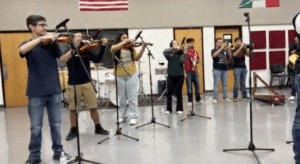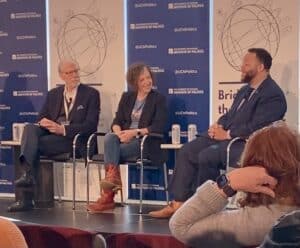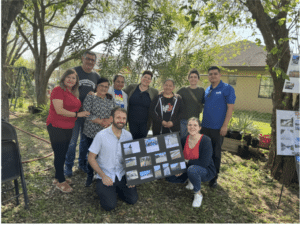Rural Assembly Everywhere Conversations
Citizen Power: Jonathan Blair and Sam Schimmel
Hear from Sam Schimmel and Jonathan Blair, co-creators of the ongoing documentary media and public engagement initiative from Citizen Film titled American Creed: Citizen Power, that explores American idealism and activism from a range of young adult perspectives. Learn how they are working to build safer, more connected communities, the barriers they face, and their advice for other young rural community organizers.
Interview highlights
On safe communities and economics
Jonathan Blair: For this region, for Appalachia, safer and more connected would be more along the lines of security in terms of economics. It would be an economy where you could easily get jobs more easily to succeed without having to leave the region because the goal here is longevity. It’s not that we want people to leave for opportunity; we want people to be able to find that opportunity here and to be able to stay here, in the health, the region grow, and to become more economica
"We know that if we intend for this region to survive, young leaders have to step forward.”
Jonathan Blair
On advice for young people
Sam Schimmel: (When I was at Stanford), the president of the Maori University in New Zealand came and he sat down all of the Native students there and he said, ‘Look, being here doesn’t do a damn thing for your community back home. You being here does nothing for anybody back home unless you go home. So it’s your job to stay here until you’re done and then go home. We don’t get to leave and go somewhere else; you have to go home.’
Watch the full video and find the transcript below to learn more.
Want stories like this delivered straight to you? Sign up for the Rural Assembly newsletter for more features and upcoming opportunities.
Transcript
Whitney Kimball Coe: In a moment, you’re going to hear from Sam Schimmel and Jonathan Blair. Sam and Jonathan are co-creators of an ongoing documentary media and public engagement initiative. It’s called American Creed Citizen Power. It’s a follow-up to the 2018 documentary, American Creed, from Citizen Film.
We’ve talked with Sam and Jonathan before when they joined us for our Connecting Our Heartlands event earlier this year, and we wanted to bring them back to talk more about how they’re working to build safer, more connected communities. Ask them about the barriers that they face and get some advice for other young rural community organizers.
We start off with two quick videos that they’ve made with Citizen Film, highlighting their communities and the work that they’re doing.
(Film clip begins)
Sam Schimmel voice over: “I was always told by my aunts and my uncles that we’ve been here forever and will be here forever. You know, if the environment’s not healthy, people aren’t healthy.
Speaker 1: “We will be here forever, but the way we are here is changing.”
Sam: Alaska is in a unique position as an oil and gas producer, timber producer, and fish producer. While we support ourselves economically, we are damaging the place that we live. How do we make money our way so that we can do our things our way?
Speaker 2: Sam will be the first Kenaitze Dena’ina attorney here on our homeland that can fight for our rights.”
Sam: We need to make sure that our community’s values remain intact while we also are moving forward with the larger world.”
Jonathan voiceover:
“American ideals – the life, liberty, and the pursuit of happiness – should have a foundation of where we come from. We’re proud that Eric and sisters, my goal, but when they start saying this is how much time your industry has left to survive, we’ve got to do something. In our work-study program, we train first-generation college graduates and business leaders. [Music] Every single one of us knew what it was like to grow up living paycheck to paycheck. There is no plan B in places like this. I think a major concern in my generation is finding that plan B.
Speaker 3: I just want to go back to my hometown and I want to open up a business.
Speaker 4: I’d like to open up a heavy equipment rental business that would help create a lot more jobs for people who don’t get a higher education.
Jonathan: We know that if we intend for this region to survive, young leaders have to step forward.
(Film clip ends)
Jonathan: For this region, for Appalachia, safer and more connected would be more along the lines of security in terms of economics. It would be an economy where you could easily get jobs more easily to succeed without having to leave the region because the goal here is longevity. It’s not that we want people to leave for opportunity; we want people to be able to find that opportunity here and to be able to stay here, in the health, the region grow, and to become more economically secure.
Sam: Connection to culture is one that’s born through food. Our traditional societies operate around hunting and gathering. When that hunting and gathering is no longer able to take place, those stories can’t be translated or exchanged around a table set with native foods. So, the first step in addressing the harms that have been done is ensuring that native foods are on the table. When that happens, silent knowledge is unlocked. Elders remember teachings and stories are passed down between generations.
[Music]
Jonathan: The best thing young people who want to make a difference can do is just, you know, to get rid of that generational stigma that nothing can be fixed here, that there’s only one way of life, only one option. Well, that option is clearly almost gone. So, you know, what I always tell people is if I did it, you can do it.
You know, I’m no extraordinary person; I’m just a regular old guy just like everybody else here. And you know, through these means of higher education like this institution and many others, there are ways to improve yourself. And by improving yourself and sticking around, you can save the region.
Sam: I’m reminded of three things that were taught to me, that were instilled in me. One is to listen, to never stop listening, to hear all sides because you really do not know the totality of a situation until you hear from all sides. And if you try and make action that is based only on the hearing of one perspective, it’s usually bad action. It’s not well-weighted, and it won’t stand the test of time.
Know your values, know what is important to you, and fight only for what is important to you. And really do not ever stop fighting for what is important in fighting for those values.
I think lastly is something I remember when I was at Stanford. The president of the Maori University in New Zealand came and he sat down all of the Native students there and he said, ‘Look, being here doesn’t do a damn thing for your community back home. You being here does nothing for anybody back home unless you go home. So it’s your job to stay here until you’re done and then go home. We don’t get to leave and go somewhere else; you have to go home.’
And so, I think the really critical, important thing with that is the ability to walk between two worlds. You cannot give up your identity simply to advocate on behalf of it. You must live out your identity and learn how to translate that identity into something that can be understood in other places. That’s the job of our generation, and that’s probably the job of a lot of our generations after us — to translate between our native ways of knowing and being and Western ideas. And so, become good at that. Master that. That requires that you know who you are and then use that to fight for your values and fight for what’s right. [Music]”







